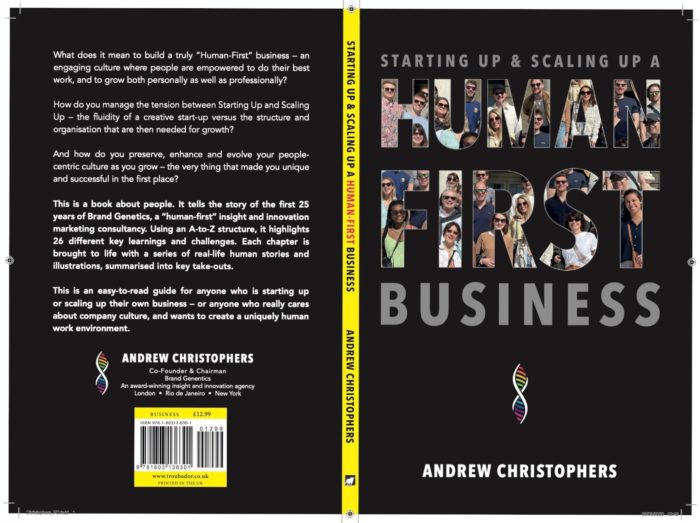It’s a sign of the success of a charity, community group or small business when it can outlive its founder members. An organisation has reached its coming-of-age, when the vision of the people who set it up is so embedded, it can thrive and survive without them.
Andrew Christophers has written Starting Up & Scaling Up A Human-First Business, as he steps back from Brand Genetics, the marketing consultancy he co-founded 25 years ago. He is essentially sharing his tips for success, rooted in the direct experience of growing a business from his kitchen table to one with a £6.1m turnover (December 2021).
Having read his book, I don’t think there’s any doubt that Brand Genetics will flourish without him in a hands-on role – and that’s the greatest compliment.
Andrew claims that Brand Genetics has achieved success through being a “human-first” organisation. His book unpacks what this means, using photographs, real-life stories and a nice big font with summaries of key take-outs at the end of each chapter. (It is a marketing consultancy after all.)
It’s distinctly lacking in pomposity and, with the slight exception of the section on Mutant Marketing, jargon-free. The book follows an A-to-Z structure, with insights appearing in alphabetical, rather logical, order. It essentially makes the book a selection of anecdotes, like pearls on a necklace. To me, this is a human-first, approach – presenting the nuggets as insights from a well-lived life rather than a thesis. Andrew says that Michael, one of his members of staff, used to joke about some of Brand Genetics work, saying: “that’s all very well in practice, but what’s the theory?” Scrap the theory – that’s what I say.
This is a book about scaling up a start-up, but it resonated with my experience of working in charities, medium-sized businesses, and global corporations too. What he says about delegation and trusting younger people to do the work will be appreciated by micro-managed employees in organisations of every size.
I took strength from his JFDI section which was about the importance of making decisions. “I once read that the best managers don’t make better decisions, they just make more decisions,” he says. Yes! Absolutely! I hereby take “Just F***ing Do It” as my modus operandi.
The most surprising tip came from his Never Stop section. I thought it a universal rule of business that you never have someone in the job at the time you need them. By the time you have identified the need, made the business case, signed off the job description, advertised the post, interviewed and waited for the new employee to hand in their notice, you are so busy doing the work yourself that you don’t have time to induct the new employee into the role. Was it not ever thus? (Or is that just the way it works in the circles where I hang out?)
Brand Genetics has an interesting take on this. They try to hire good people BEFORE they need them, knowing they will need them one day. There’s something I never thought of before… “Never Stop selling, and never stop recruiting either,” says Andrew.
The most touching anecdote came in Y is for You, which was about being your true self at work. From the style of his book, it’s easy to imagine that Andrew is a bit of an operator in business. He admits that he was good at putting on a suit and playing the game. Who’s to say that his business wasn’t just like all the others – where the guys at the top deliver a nice patter about employee-care but are no different from anyone else in reality?
I found myself believing that Brand Genetics really was a human-first business when Andrew admits that putting on a suit and playing the game came at a cost of being true to himself. He says he didn’t want that. And he wanted everyone at Brand Genetics to be their true selves, warts and all. So one of his employees would come to work in shorts and bring his dog with him too – and they loved him for it.
For me, that heart-warming anecdote brought a distinct layer of authenticity to this beautifully presented and easily digestible book. I believe Brand Genetics really is a human-first business – and as such businesses of all sizes need to sit up and listen.
(I don’t suppose you’ve got a job going, have you?)
(Starting Up & Scaling Up A Human-First Business by Andrew Christophers is published by Troubador and costs £12.99)

